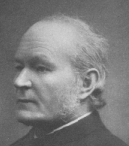
F.W. Farrar on “Aeonian”
“Of all the arguments on this question, the one which appears to me the most absolutely and hopelessly futile, is the one in which so many seem to rest with entire content; viz. that "eternal or aeonian life" must mean endless life, and therefore that “aeonian chastisement” must mean “endless chastisement.” This battered and aged argument, . . . if it had possessed a particle of cogency, would not have been set aside as entirely valueless by such minds as those of Origen and the two Gregories in ancient days, nor by multitudes in the days of St.
Augustine and St. Jerome, nor by the most brilliant thinker among the schoolmen, nor by many of our greatest living divines . . . . No proposition is capable of more simple proof than that aeonian is not a synonym of endless. It only means, or can mean, in its primary sense, pertaining to an aeon, and therefore “indefinite,” since an aeon may be either long or short; and in its secondary sense “spiritual,” “pertaining to the unseen world,” “an attribute of that which is above and beyond time,” an attribute expressive not of duration but of quality. Can such an explanation of the word be denied by any competent or thoughtful reader of John 5:39; 6:54; 17:3; 1 John 5:13,20? Would not the introduction of the word “endless” into those Divine utterances be an unspeakable degradation of their meaning? And as for the argument that the redeemed would thus lose their promised bliss, it is at once so unscriptural and so selfish that, after what Mr. Cox and others have said of it, one may hope that no one will ever be able to use it again without a blush. I cannot here diverge into a discussion with Bishop Wordsworth and Canon Ryle, whose sermons need some adversaria rather longer than I can here devote to them; but as they both dwell on the fact that people who spoke Greek interpreted aionios to mean endless, I reply that some of the greatest masters of Greek, both in classical times and among the Fathers, saw quite clearly that, though the word might connote endlessness by being attributively added to endless things, it had in itself no such meaning. I cannot conceive how any candid mind can deny the force of these considerations. If even Origenists would freely speak of future punishment as aionios but never as ateleutetos [without end] –– if, as even these papers have shown, Plato uses the word as the antithesis of endlessness –– if St. Gregory of Nyssa uses it as the epithet of “an interval”–– if, as though to leave this Augustinian argument without the faintest shadow of a foundation, there are absolutely two passages of Scripture (Hab.3:6 and Rom.16:25,26) where the very word occurs in two consecutive clauses, and is, in the second of the two clauses, applied to God, and yet is, in the first of the two clauses, applied to things which are temporary or terminated –– what shall be said of disputants who still enlist the controversial services of a phantom which has been so often laid in the tomb from which it ought never again to emerge? How is it that not one out of the scores of writers who have animadverted on my book have so much as noticed the very remarkable fact to which I have called attention, that those who followed Origen in holding out a possible hope beyond the grave founded their argument for the terminability of torments on the acknowledged sense of this very word, and on the fact that other words and phrases which do unmistakably mean endless are used of the duration of good, but are never used of the duration of evil?”
The Wider Hope (1890), pages 327-330.

On the Word “Eternal”
In His book “God’s Methods with Man” the Rev. G. Campbell Morgan says this about the word “eternal”:
“Let me say to Bible students that we must be very careful
how we use the word “eternity.” We have fallen into great
error in our constant use of that word. There is no word
in the whole Book of God corresponding with our “eternal,”
which, as commonly used among us, means absolutely without end.
The strongest Scripture word used with reference to the existence
of God, is–“unto the ages of the ages,” which does not literally
mean eternally. Let us remember however that the self-same word,
which is thus used in connection with the existence of God, is also
applied to the loss of the human soul. Men have divided the
Church, separated from each other, and persecuted one another,
upon a thought conveyed by an English word which has no equivalent
in the Bible.”
George Campbell Morgan

God’s Righteousness
“I greatly longed to understand Paul’s Epistle to the Romans and nothing stood in the way but one expression, ‘the justice of God,’ because I took it to mean that justice whereby God is just and deals justly in punishing the unjust. My situation was that, although an impeccable monk, I stood before God as a sinner troubled in conscience, and I had no confidence that my merit would assuage him. Therefore I did not love a just and angry God, but rather hated and murmured against him. Yet I clung to the dear Paul and had a great yearning to know what he meant.”
“Night and day I pondered until I saw the connection between the justice of God and the statement that ‘the just shall live by faith.’ Then I grasped that the justice of God is that righteousness by which through grace and sheer mercy God justifies us through faith. Thereupon I felt myself to be reborn and to have gone through open doors into paradise. The whole of Scripture took on a new meaning, and whereas before the ‘justice of God’ had filled me with hate, now it became to me inexpressibly sweet in great love. This passage of Paul became to me a gate to heaven.”
Martin Luther
Copyright © Saviour of All Fellowship
P.O. Box 314,
Almont, MI 48003, U.S.A. 810-798-3563
This publication may be reproduced for personal use
(all other rights reserved by copyright holder).